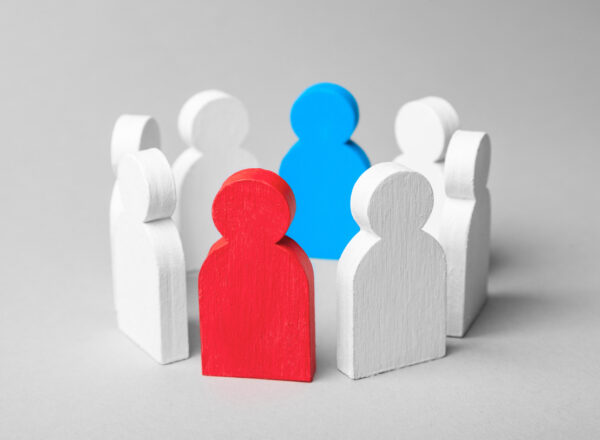
We’re only human. Do we have what it takes to make democracy work?
“The real problem of humanity is the following: we have paleolithic emotions; medieval institutions; and god-like technology.”
These words, uttered decades ago by scientist E.O. Wilson, never rang truer. Today, democracy in the U.S. and around the world is getting pummeled by a perfect storm of cultural tribalism, weakening institutions, and technology-driven polarization. Healthy democracies depend on the active, engaged, and informed participation of the citizens that comprise them. It’s reasonable to ask ourselves: in today’s mind-boggling cultural, political, media, and technology context, are we up to the task?
Here’s the problem. As humans, we’re prone to think and behave in ways that aren’t always healthy for ourselves, our families, our communities, or civic society as a whole. We can be quick to judge, lacking in empathy and tolerance, incapable of discerning fact from fiction, and blinded by cognitive biases that impede rational decision-making.
Ironically, many of these traits emerged naturally – even helpfully – to support human evolution. We became tribal to achieve safety in numbers. We learned to make snap judgments as a matter of survival. Cognitive biases developed as a way to make decisions more rapidly and efficiently. Similarly, strong moral codes became etched into our DNA because they helped us thrive as the first social species with language.
Today, however, these evolutionary cognitive and social traits can wreak havoc, sowing division and slowing progress across our modern civic landscape. At worst, they impede our ability to come together in search of practical solutions to the looming policy issues of our time, such as climate change, wealth inequality, and massive economic burdens being placed on younger generations.
As a citizenry, we urgently need to come together, collaborate, and compromise to tackle these issues. But this won’t happen when our cognitive limitations lock us into irrational positions, or our stance on moral issues leads us to view political “others” as evil or contemptible.
How do we break these habits? For starters, each of us needs to better understand – and strive to counteract – the powerful cognitive biases that inhibit each of us from fulfilling our individual roles and responsibilities as democratic citizens. For example, motivated reasoning: research shows that rather than search rationally for information that either confirms or disconfirms a particular belief, people only seek out information that confirms what they already believe.
While cognitive biases constrain how we think, rigid moral codes can distort how we feel, especially towards people who embrace vastly different moral codes. Until we can better understand and respect each others’ moral underpinnings, we will struggle to find the common language and reframing language and common ground needed to identify and implement promising ideas.
Here’s some good news: First, the need for more robust cognitive skills is creating a surge of academic inquiry in the behavioral social sciences. Countless scholars — across fields as diverse as psychology, sociology, philosophy, economics, and political science — are engaged in the hunt to deliver insights about how to nudge human behavior towards more pro-social, pro-democratic ideas, interactions, and decisions.
At the same time, these scholars’ insights fuel the work of a growing number of social organizations that seek to disseminate positive interventions as quickly and broadly as possible. In the very best cases, these organizations are transforming the political, social, and media engines that have been so effective at sowing division into tools for civic connection, cohesion, and renewal.
Now for the bad news: All of this needs to be happening faster, on a bigger scale, in a more integrated way. In academia, the shift from descriptive (“why are we so divided?”) to normative (“what should we do about it?”) inquiry must accelerate. Scholars should also step up efforts to collaborate across disciplines and institutions, rather than devising partial or overlapping recommendations from within narrowly-defined academic silos.
Meanwhile, the landscape of social organizations working to repair our fractured civil society is highly fragmented and sorely underfunded. Large individual and institutional donors are not yet “woke” to the quietly heroic efforts of organizations seeking to stitch America’s frayed social fabric back together. America’s donor class tends to be far more captivated by partisan candidates, causes, and issues; unfortunately, in an atmosphere of extreme polarization and political gridlock, even vast amounts of partisan spending can have only limited impact.
Enter Civic Health Project. Civic Health Project (CHP) was founded to accelerate the work of academics and practitioners who are tackling the problem of political polarization at a foundational level, by shoring up the individual cognitive, moral, and emotional toolkits we all need to fulfill our obligations as democratic citizens. Through a mix of grant-making, advocacy, and networking activities, we champion the efforts of those who offer promising remedies to help us all to overcome our all-too-human tribalistic and polarizing tendencies.
Here are the projects we proudly support. We invite others to join us as co-investors in the advanced behavioral insights, skills, and interventions needed to fulfill democracy’s ultimate promise: A thriving society that is diverse in perspectives, but unified enough to tackle hard problems together.
